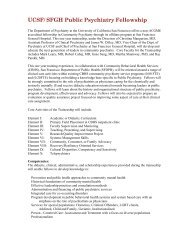Psychosis First Aid Guidelines for Loved Ones
Psychosis First Aid Guidelines for Loved Ones
Psychosis First Aid Guidelines for Loved Ones
Create successful ePaper yourself
Turn your PDF publications into a flip-book with our unique Google optimized e-Paper software.
MENTAL HEALTH<br />
FIRST AID<br />
PSYCHOSIS<br />
<strong>First</strong> <strong>Aid</strong> <strong>Guidelines</strong> <strong>for</strong> <strong>Loved</strong> <strong>Ones</strong><br />
People experiencing psychosis may exhibit some of the described<br />
warning signs, however, the signs and/or symptoms of psychosis may<br />
vary from person to person and can change over time. You should also<br />
consider the spiritual and cultural context of the persons behaviors, as<br />
what is considered to be ‘normal’ in one culture may be interpreted as<br />
a symptom of psychosis in another culture.<br />
HOW DO I KNOW IF THIS IS PSYCHOSIS<br />
It is important to learn about the early warning signs of psychosis so that you<br />
can recognize when someone may be developing psychosis. Although these signs<br />
may not be very dramatic on their own, when you consider them together, they<br />
may suggest that something is not quite right. It is important not to ignore or<br />
dismiss such warning signs, even if they appear gradually and are unclear. Do not<br />
assume that the person is just going through a phase or misusing alcohol or other<br />
drugs, or that symptoms will go away on their own.<br />
HOW SHOULD I APPROACH SOMEONE<br />
People developing a psychotic disorder will often not reach out <strong>for</strong> help.<br />
Someone who is experiencing profound and frightening changes such as<br />
psychotic symptoms will often try to keep them a secret. If you are concerned<br />
about someone, approach the person in a caring and non judgmental manner<br />
to discuss your concerns. The person you are trying to help might not trust you<br />
or might be afraid of being perceived as “different”, and there<strong>for</strong>e may not<br />
be open with you. If possible, you should approach the person privately about<br />
their experiences in a place that is free of distractions.<br />
WARNING SIGNS<br />
Changes in emotion and<br />
motivation:<br />
4Depression;anxiety;<br />
irritability; blunted; flat or<br />
inappropriate emotion; change<br />
in appetite; reduced energy and<br />
motivation<br />
Changes in thinking and<br />
perception:<br />
4 Difficulties with<br />
concentration or attention;<br />
sense of alteration of self, other<br />
or outside world (e.g. feeling<br />
that self or others have changed<br />
or are acting differently in<br />
some way); odd ideas; unusual<br />
perceptual experiences (e.g. a<br />
reduction or greater intensity of<br />
smell, sound, or color).<br />
Changes in behavior:<br />
4 Sleep disturbance; social<br />
isolation or withdrawal; reduced<br />
ability to carry out work or<br />
social roles<br />
Try to tailor your approach and interaction to the way the person is behaving<br />
(e.g. if the person is suspicious and is avoiding eye contact, be sensitive to this and give them the space they need). Do<br />
not touch the person without their permission. You should state the specific behaviors you are concerned about and should<br />
not speculate about the person’s diagnosis. It is important to allow the person to talk about their experiences and beliefs<br />
if they want to. As far as possible, let the person set the pace and style of the interaction. You should recognize that they<br />
may be frightened by their thoughts and feelings. Ask the person about what will help them to feel safe and in control.<br />
Reassure them that you are there to help and support them, and that you want to keep them safe. If possible, offer the<br />
person choices of how you can help them so that they are in control. Convey a message of hope by assuring them that help<br />
is available and things can get better.<br />
If the person is unwilling to talk with you, do not try to <strong>for</strong>ce them to talk about their experiences. Rather, let them know<br />
that you will be available if they would like to talk in the future.<br />
SUPPORT COMMUNICATION ENCOURAGEMENT<br />
Treat the person with respect.<br />
Empathize with how the person feels<br />
about their beliefs and experiences,<br />
without stating judgments about<br />
the content of those beliefs and<br />
experiences.<br />
Avoid confronting the person and do<br />
not criticize or blame them. Understand<br />
the symptoms <strong>for</strong> what they are and try<br />
not to take them personally. Do not use<br />
sarcasm and avoid using patronizing<br />
statements.<br />
It is important that you are honest when<br />
interacting with the person.<br />
People experiencing symptoms of<br />
psychosis are often unable to think<br />
clearly. Respond to disorganized<br />
speech by communicating in an<br />
uncomplicated and succinct manner,<br />
and repeat things if necessary. Be<br />
patient and allow plenty of time <strong>for</strong><br />
the person to process the in<strong>for</strong>mation<br />
and respond. If the person is showing<br />
a limited range of feelings, you should<br />
be aware that it does not mean that<br />
the person is not feeling anything.<br />
Likewise, you should not assume the<br />
person cannot understand what you<br />
are saying, even if their response is<br />
limited.<br />
Ask the person if they have felt this<br />
way be<strong>for</strong>e and if so, what they<br />
have done in the past that has been<br />
helpful. Try to find out what type of<br />
assistance they believe will help them.<br />
Also, determine whether the person<br />
has a supportive social network, if<br />
so, encourage them to utilize these<br />
supports.<br />
If the person decides to seek<br />
professional help,make sure they<br />
are supported both emotionally and<br />
practically in accessing services.
WHAT IF THE PERSON DOESN’T WANT HELP<br />
The person may refuse to seek help even if they realize they are unwell. Their confusion and fear about what is<br />
happening to them may lead them to deny that anything is wrong. In this case, encourage them to talk to someone<br />
they trust. It is also possible that a person may refuse to seek help because they lack insight that they are unwell.<br />
They might actively resist your attempts to encourage them to seek help.<br />
It is important to recognize that unless a person with psychosis meets the criteria <strong>for</strong> involuntary committal<br />
procedures, they cannot be <strong>for</strong>ced into treatment. If they are not at risk of harming themselves or others, you<br />
should remain patient, as people experiencing psychosis often need time to develop insight regarding their illness.<br />
Do not threaten the person with hospitalization. Instead remain friendly and open to the possibility that they may<br />
want your help in the future.<br />
WHAT TO DO...<br />
In a crisis situation, try to remain as calm as possible. Evaluate the situation by<br />
assessing the risks involved. It is important to assess whether the person is at risk<br />
of suicide (please see the warning signs at http://www.suicidepreventionlifeline.<br />
org/Get Help/SuicideWarningSigns.aspx). If the person has an advance directive<br />
or relapse prevention plan, follow those instructions. Try to find out if the person<br />
It is important to recognize that<br />
delusions and hallucinations<br />
are very real to the person. You<br />
should not dismiss, minimize,<br />
or argue with the person about<br />
their delusions or hallucinations.<br />
Similarly, do not act alarmed,<br />
horrified, or embarrassed by<br />
such delusions or hallucinations.<br />
You should not laugh at the<br />
person’s symptoms of psychosis.<br />
If the person exhibits paranoid<br />
behavior, do not encourage or<br />
inflame the person’s paranoia.<br />
Call us. 415.476.7278<br />
has anyone s/he trusts and try to enlist<br />
their help. Try to also assess whether it<br />
is safe <strong>for</strong> the person to be alone and,<br />
if not, should ensure someone stays with<br />
them.<br />
It is important to communicate to the<br />
person in a clear and concise manner<br />
and use short, simple sentences. Speak<br />
quietly in a nonthreatening ton of voice<br />
at a moderate pace. If the person asks<br />
you questions, answer them calmly. You<br />
should comply with requests unless they<br />
are unsafe or unreasonable. This gives the<br />
person the opportunity to feel somewhat<br />
in control.<br />
Be aware that the person might act upon<br />
a delusion or hallucination. Remember<br />
that your primary task is to de-escalate<br />
the situation and there<strong>for</strong>e you should not do anything to further agitate the<br />
person. Try to maintain safety and protect the person, yourself, and others around<br />
you from harm. Make sure that you have access to an exit.<br />
Realize that you may not be able to de-escalate the situation and if this is the<br />
case, be prepared to call <strong>for</strong> assistance. If the person is at risk of harming<br />
themselves or others, make sure they are evaluated by a medial or mental health<br />
professional immediately. If crisis staff arrive, you should convey specific, concise<br />
observations about the severity of the person’s behavior and symptoms to the<br />
crisis staff. Explain to the person you are helping who any unfamiliar people are,<br />
that they are there to help and how they are going to help. However, if your<br />
concerns about the person are dismissed by the services you contact, you should<br />
preserve in trying to seek support.<br />
Take any threats or warnings seriously. If you are frightened, seek outside help<br />
immediately. Never put yourself at risk. Similarly, if the person’s aggression<br />
escalates out of control at any time, you should remove yourself from the<br />
situation and call 211 or 911 <strong>for</strong> help. When contacting the appropriate<br />
mental health service, outline any symptoms and immediate concerns.<br />
If the situation becomes unsafe, it may be necessary to involve the police.<br />
To assist the police in their response, tell them that you suspect the person is<br />
experiencing a psychotic episode and that you need their help to obtain<br />
medical treatment. Tell the police whether or not the person is armed.<br />
These guidelines were adapted with permission from ORYGEN research center. They are a general set of recommendations<br />
about how you can help someone who may be experiencing psychosis. Each individual is unique and it’s important to tailor<br />
your support to the individual.<br />
AGGRESSION<br />
MENTAL HEALTH<br />
FIRST AID<br />
People with psychosis are not usually<br />
aggressive and are at a much higher<br />
risk of harming themselves than<br />
others. However, certain symptoms<br />
of psychosis (e.g. delusions or<br />
hallucinations) can cause people to<br />
become aggressive. You should know<br />
how to de-escalate the situation if<br />
the person you are trying to help<br />
become aggressive.<br />
DE-ESCALATION<br />
4Do not respond in a hostile,<br />
disciplinary, or challenging manner<br />
to the person;<br />
4Do not threaten them as this may<br />
increase fear or prompt aggressive<br />
behavior;<br />
4 Avoid raising your voice or<br />
talking too fast;<br />
4Stay calm and avoid nervous<br />
behavior (e.g. shuffling your<br />
feet, fidgeting, making abrupt<br />
movements);<br />
4Do not restrict the person’s<br />
movement (e.g. if he or she wants to<br />
pace up and down the room);<br />
4Remain aware that the person’s<br />
symptoms or fear causing their<br />
aggression might be exacerbated if<br />
you take certain steps (e.g. involve<br />
the police).<br />
The PREP Program is an academiccommunity<br />
partnership between<br />
The University of Cali<strong>for</strong>nia, Family<br />
Service Agency (FSASF) of San<br />
Francisco, and The Mental Health<br />
Association of San Francisco (MHASF).<br />
Our goal is to provide comprehensive,<br />
evidence-based services to people<br />
suffering from signs and symptoms<br />
of serious<br />
mental<br />
illness.<br />
Visit us. www.prepwellness.org















